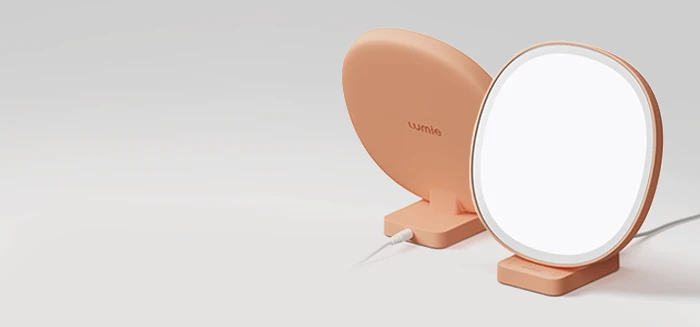Bringing the Sunshine Indoors: Supporting Well-Being with Light Therapy
.jpg)
Light is the strongest synchroniser of our circadian rhythms, 24-hour cycles in physiology and behaviour. These cycles are driven by an internal clock which is often referred to as the circadian pacemaker. The sleep/wake cycle is a circadian rhythm that we are all familiar with but there are in fact rhythms in nearly all aspects of our physiology and behaviour. This includes our metabolism and the production of certain hormones. When our circadian rhythm becomes out of sync, it can impact both our mental and physical health. So, lets explore how our light exposure throughout the day can help to regulate our rhythms.
Starting our day with exposure to natural light provides a strong signal to our body that it is time to be alert, rather than time to be asleep, and as a result helps to keep our circadian rhythm aligned with the external night and day. Going for a morning stroll outdoors or sitting by a window and enjoying the sunshine helps to boost mood and energy due to the sun’s ability to influence the levels of melatonin and serotonin in the body. When spending significant amounts of time indoors and in dimly lit environments such as workspaces with limited natural light, many of us experience a dip in our mood and energy levels. This is a feeling that we also recognise during the autumn and winter months when daylight hours are reduced. When it isn’t possible to get outdoors and soak up the daylight, a bright light therapy session helps to bring the mood-boosting powers of sunlight to wherever you are!
All Lumie bright light therapy lamps deliver 10,000 lux to boost mood and energy, and support our overall sense of well-being. A daily session of bright light therapy can be easily integrated into your daily routine. Simply place your bright light therapy lamp at around arms length away from you and angle it towards your face - there is no need to look directly at the light. You can start with a 30-minute session in the morning (this could be while having breakfast or working from your desk!) and if the afternoon slump is something that you usually experience, then a top-up session in the early afternoon can help you to feel more energised.
As exposure to bright light helps to increase our energy levels and alertness, this kind of light in the evening isn’t conducive to good quality sleep. As we head towards the evening, opting for warmer tones in our lighting signals to our body that it is time to wind down - helping to keep that all-important circadian rhythm in sync with the external night and day.
Research suggests that the alerting blue light and stimulating content of mobile phones can cause poor quality sleep when used a minimum of 30 minutes before bed. Creating a sleep-optimised environment away from screens can help you to drift off more easily. Lumie sunrise alarms help to prepare your body for sleep by fading through the tones of a natural sunset. They make the perfect all-in-one bedside lamp and alarm clock and help you to remove the need for mobile phones in the bedroom. When the morning comes around, they wake you gently with gradually brightening light which emulates the colours of a natural sunrise, helping you to wake feeling refreshed and regulating your circadian rhythm.
So, being mindful of your light environment throughout the day and at bedtime helps to keep your circadian rhythm in sync, supporting both physical and mental well-being. Try to remember that morning light cue and avoid bright light in the evening. You can find out more about the influence of light on the sleep/wake cycle here.
You are not alone. If you are experiencing difficulties with your physical or mental health, it is important to seek advice from a medical practitioner.





.jpg)
.jpg)